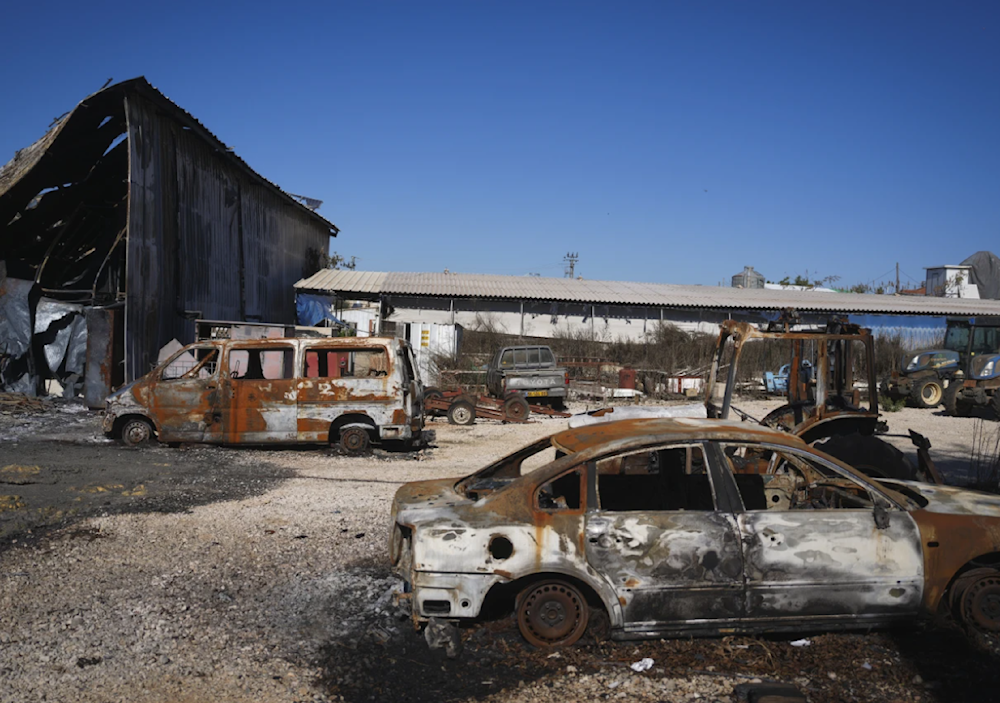Upper al-Jalil struggles: 15 months of war and 'failure' of response
The head of the Upper Galilee Regional Council called the Israeli occupation on the civil level, a "failure that is difficult to describe."
-

Burned-out cars and buildings from Lebanese resistance rockets are seen in the settlement of Avivim near the Lebanese border in the Upper al-Jalil in occupied Palestine on December 2, 2024. (AP)
According to Giora Zlatz, head of the Israeli Upper Galilee Regional Council, "We are in a failure that is difficult to describe. We have been at war for 15 months, and no one has the responsibility or budget to deal with the issues of the residents of the north."
Speaking to Israeli Channel 12, he explained that the Israeli occupation, on the civil level, is "in a failure that is difficult to describe," pointing out that 65% or 200,000 of the settlers have been in a war zone for 15 months," urging their need for "immediate assistance."
Israeli website Walla revealed that out of 450 homes in Metulla, "210 homes were damaged as a result of direct strikes, shrapnel, or the effects of explosions."
The website added that "nearly 1,600 rockets and mortar shells, in addition to 450 anti-tank missiles, were fired at the settlement."
According to Israeli publication Yedioth Ahronoth, the “resilience centers” in the Eastern and Western al-Jalil, which served as the first line of support – psychologically and socially – to “residents of the border with Lebanon” during the war, are facing “the risk of collapse.”
The publication emphasized that "the budget allocated to them for the year 2024, amounting to 39 million shekels, is about to run out, and for the year 2025, funding has not yet been approved to ensure the continuation of the activity."
33% northern settlers refuse to return, slam 'unfulfilled promises'
50% of Israeli settlers in northern occupied Palestine are taking sedatives, 33% do not want to return to their residences, and 36% of the displaced are receiving psychological therapy, the Israeli Channel 12 reported, citing the Tel-Hai Academic College.
Channel 12 concluded from the findings that settlers in the north do not accept the security assurances provided by the Israeli military, pointing out that very few have returned to their residences so far.
According to the Israeli channel, this percentage has risen by approximately 20% compared to eight months ago when a similar study was conducted, showing only 13% at the time.
The report also indicated that settlers "who were not evacuated from the north say their economic situation is worse than those who were displaced."
Moreover, 50% of northern residents, across all demographics, reported starting to take sedatives and sleeping pills over the past year.
Additionally, 36% of displaced residents and 24% of those who remained in their residences are seeing a psychologist.
Channel 12 also highlighted the concerns of northern settlers, reporting that "residents are deeply worried about the future, even if they do not return to their homes," adding that they are also frustrated with "unfulfilled promises and are waiting for tangible actions on the ground."
Earlier, the media outlet reported that data on the destruction in northern settlements show that 2,585 residences were damaged, including 1,000 with major damage, as a result of Hezbollah fire launched from Lebanon.

 3 Min Read
3 Min Read








